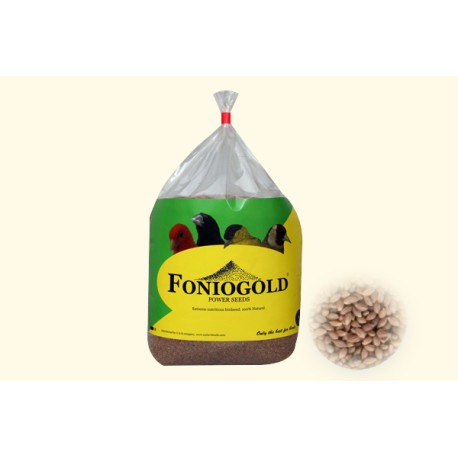- New






Reference: 161311
Foniopaddy Seed is a natural grass seed grown on our plantations in Uganda. Scientific research has shown that Foniopaddy has a beneficial effect on coccidiosis.
Foniopaddy Seed is a natural grass seed grown on our plantations in Uganda. Scientific research has shown that Foniopaddy has a beneficial effect on coccidiosis.
Instructions
Can be administered freely. It is best to administer Foniopaddy separately because the seeds have a very fine structure, which would cause them to sink to the bottom of the mixture when mixed with other seeds.
Niger, birdseed rich in phosphorus and calcium. Niger seeds (or nyjer seeds) are fine seeds rich in oil. They come from Guizotia abyssinica (also known as Guizotia oleiferous). The niger is highly prized by most birds, goldfinches and siskins love it.
The seed is mainly grown in India, Burma, Ethiopia and Nepal. Niger is an oilseed with a high fat content (38-43%) and protein content (23%). It provides quality food for all species of wild and forest birds, both in dry and sprouted form.
Niger is one of the few birdseeds with a good ratio of calcium to phosphorus.
Canary seed is a grass, an annual plant that can reach up to 1m in height, with seeds found in the inflorescences. These seeds make up a significant portion of most bird seed mixes.
• Excellent for canaries, European and exotic birds, budgerigars, and large parakeets.
• EXTRA canary seeds have undergone additional cleaning and are of exceptional quality. Unique on the market!
Spinach seeds contain vitamins A, B1, B2, B3, B7, B9 and C, mineral salts and trace elements. Regular consumption helps to strengthen the feathers.
Chicory seeds (cichorium intybus) are among the health seeds that come from wild plants. These seeds are rich in fiber and minerals and help maintain intestinal balance.
They purify the body and are also effective in cases of indigestion.
Seeds for canaries and exotic and native birds.
Paddy rice seed or raw rice is perfectly suitable for exotic birds with strong beaks such as the Java sparrow and Asian-origin birds. This seed is also appreciated by parakeets, parrots, and exotic doves.
They have the property of binding to minerals such as calcium, iron and zinc and making them less bioavailable.
Cedar nuts contain approximately 55% of valuable unsaturated fatty acids, particularly linoleic and alpha-linolenic acid, as well as the rare pinoleic/pinolenic acid. They are rich in tocopherols (vitamin E) as antioxidants and high-quality proteins (approx. 17%). They also contain numerous minerals (including magnesium, potassium, phosphorus), trace elements (copper, manganese, zinc), vitamins (K and B), and flavonoids.
Rowan berry in dried fruit form, which hooked beaks, native birds, and tropical birds are fond of. Use it to enrich your seed mixes or as treats. Dried fruits have a very long shelf life. Use them daily and in every season for a balanced diet to avoid deficiencies.
Pine seeds are a good source of Phosphorus, Magnesium, Zinc, Manganese, Copper, Iron, Vitamin E, K, B1, B2, B3, B9.
The canary seed is a grass, an annual plant up to 1m tall, the seeds being found in the inflorescences. These seeds make up a significant fraction of the majority of bird mixes.
• Excellent for canaries, European and exotic birds, wavy parakeets and large parakeets.
Hemp seeds are very nutritious and contain more essential fatty acids (EFAs) than any other source and rank second, after soybeans, for their richness in highly digestible proteins of high biological value. They are particularly recommended during reproduction periods to stimulate the reproductive instinct of birds.
Flaxseed is composed of 40 to 45% oil and 25% protein. Flaxseed keeps very well. In particular, it contains two fatty acids with similar names (and whose root is the word "flax"), linolenic acid (an omega 3) and linoleic acid.
The seed is used in animal feed, especially for laying hens whose omega 3 content is to be increased.
Through these properties, this seed promotes digestion.
Millet is used in the diet of all birds: straight beaks and hooked beaks. In clusters, it's a delicacy they love.
Millet in clusters has a good protein and carbohydrate content and it also contains a large number of amino acids. Ideal to distract your birds and thus avoid pecking (pulling feathers).
We advised to give red millet for exotic birds. It is richer in protein than yellow millet.

Foniopaddy Seed is a natural grass seed grown on our plantations in Uganda. Scientific research has shown that Foniopaddy has a beneficial effect on coccidiosis.
